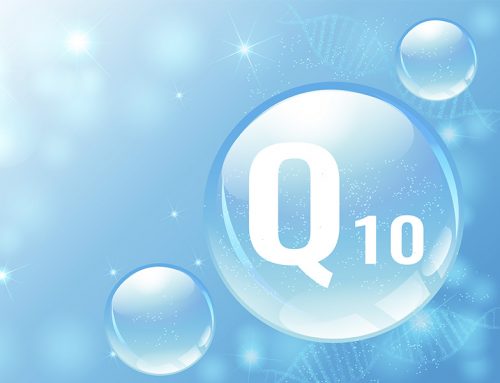In elderly individuals who were low on both substances, a daily combination of selenium and CoQ10 supplements slowed the aging process and promoted survival. This is the take-home lesson from the Swedish KiSel-10 study, a randomized controlled trial in which the study participants took either the selenium/CoQ10 supplements or matching placebos daily for four years [Alehagen 2013].

With increasing age, we begin to lose some of our cognitive functioning: learning, remembering, concentrating, reasoning. Research studies show that adequate intakes of Coenzyme Q10 and selenium are necessary to avoid cognitive decline.
At the start of the study, the Swedish citizens who took part in the study had an average age of 78 years. They had an average serum selenium concentration that was at a deficiency level (67.1 mcg/L) and an average CoQ10 concentration that was at a sub-optimal level (0.82 mg/L). Four years of daily supplementation with a selenium-enriched yeast preparation and a ubiquinone CoQ10 preparation raised the mean blood levels in the active treatment group to 210.3 mcg/L and 2.17 mg/L for selenium and CoQ10, respectively [Alehagen 2020a].
After four years, the KiSel-10 study researchers could document the following significant anti-aging benefits associated with the combined selenium and CoQ10 treatment:
- reduced risk of cardiovascular mortality
- improved heart function and improved quality of life
- decreased levels of oxidative stress and chronic inflammation
- less shortening of telomere length
- pronounced changes in biomarkers indicating an anti-aging effect
The anti-aging effects seen in the KiSel-10 study prompt the question: could a similar combination of selenium and CoQ10 supplements slow the rate of cognitive decline in the elderly? What is the evidence?
Selenium Supplementation for Better Cognitive Function
In any discussion of selenium and cognitive function, it is important to emphasize the following points:
- Selenium crosses the blood-brain barrier. Selenium is so important to brain function that it is distributed preferentially to the brain in times of low selenium intakes [Schomburg 2022].
- Sub-study analysis of data from the KiSel-10 study shows that selenium supplementation of selenium-deficient individuals improves kidney function and that selenium supplementation in this group improves cognition [Alehagen 2020b].
- Higher levels of chronic inflammation are associated with poorer cognitive function. Sub-study analysis of data from the KiSel-10 study shows that selenium supplementation reduced the level of systemic inflammation and thus improves cognition [Alehagen 2018].
The Nine-Year French Longitudinal EVA Study
The EVA study was a cohort study of vascular aging in community-dwelling French citizens aged 60-71 years who started the study with normal neuropsychologic test results and a mean selenium status of approximately 90 mcg/L. The French researchers controlled for an effect of possibly confounding variables such as diabetes, dyslipidemia, education level, history of cardiovascular disease, hypertension, plasma selenium level at baseline, and sex. After nine years of follow-up, they made the following observations [Akbaraly 2007]:
- The probability of cognitive decline increased with the decrease in plasma selenium concentrations over time.
- Among subjects who had a decrease in plasma selenium levels, the greater the decrease in plasma selenium levels, the higher the probability of cognitive decline was.
- Among subjects who had an increase in plasma selenium levels, the probability of cognitive decline was higher in subjects with the smallest plasma selenium increase.
- The study results document a relationship between selenium status and neuropsychologic functions in aging people. The preventive effect of selenium supplementation at a nutritional level needs to be evaluated.
The Chinese Rural Provinces Study
Gao et al conducted a cross-sectional survey of 2,000 Chinese citizens aged 65 years or older who were living in two rural provinces. Over 70% of the study participants had lived in the same village since birth. The researchers collected nail samples and analyzed them for selenium content. They then compared quintiles of selenium concentration with cognitive test scores [Gao 2007].
- Lower selenium levels in nail samples were significantly associated with lower cognitive scores.
- There was a dose-response effect of selenium quintiles associated with the cognitive scores.
- Lifelong low selenium concentrations seem to be significantly associated with lower cognitive function.
The Italian InChianti Population-Based Study
The Italian researchers enrolled 1,012 participants with an average age of 75 years. More than half (56%) were women. The average concentration of plasma selenium was 74.5 mcg/L. They observed that plasma selenium concentrations decreased with advancing age [Shahar 2010].
- Low plasma selenium concentrations are associated with subtle neurological impairments reflected in soft neurological signs such as worsening coordination.
- Lower plasma selenium concentrations are associated with poorer coordination in both upper and lower extremities.
The Pereira Meta-Analysis of Selenium Supplementation Studies
Pereira et al evaluated the results of six studies of solo selenium supplementation.
- With only selenium supplementation, the researchers observed an improvement in selenium levels, glutathione peroxidase activity, and in some cognitive tests in patients with mild cognitive impairment. In patients diagnosed with Alzheimer’s disease, they observed improvement in selenium levels and in the mini-mental score.
- In studies of supplementation with selenium plus other micronutrients including Coenzyme Q10, the researchers observed improvement in cognitive tests in both Alzheimer’s disease patients and in patients with mild cognitive impairment.
- The meta-analysis shows that selenium supplementation is a good alternative for patients with Alzheimer’s disease and with mild cognitive impairment.
- The antioxidant activity of seleno-enzymes such as the glutathione peroxidases in reducing oxidative stress in the brain may explain the beneficial effect of selenium supplementation on cognitive function.
CoQ10 Supplementation for Better Cognitive Function
With increasing age, beginning after the age of 40 years and especially after the age of 70 years, the volume of the brain shrinks. In the same span of years, the brain cells’ biosynthesis of CoQ10 falls off markedly [Mantle 2022].
As of this writing, there have been no randomized controlled studies to assess the beneficial impact of CoQ10 supplementation on cognitive function. However, the observational studies summarized below point to a link between CoQ10 status and cognitive decline.
The Spanish Coenzyme Q10 Cognitive Functioning Study
Fernández-Portero et al conducted a study of 64 older adults (48 female) with an average age of 76 years. In varying degrees, the 64 study participants had conditions common to their high age: diabetes, hypertension, and chronic inflammation. These conditions were not likely to affect CoQ10 status. The researchers deliberately excluded from the study any volunteers who were taking a cholesterol reducing medication as these medications can and do affect CoQ10 biosynthesis [Fernández-Portero 2023].
- The study data showed that plasma CoQ10 concentrations are positively and significantly associated with cognitive functioning and executive function. Note that the researchers controlled for possibly confounding variables such as age, exercise level, and nutritional status.
- The researchers suggested that declines in cognitive functioning may be related to reduced antioxidant and anti-inflammatory defenses that are associated with low CoQ10 levels in older adults.
- Sub-study analyses of the data from the KiSel-10 study have shown that combined selenium and CoQ10 supplementation is significantly associated with reduced levels of blood bio-markers for oxidative stress and chronic inflammation [Alehagen 2018].
The Chinese Diet Habits and Cognitive Function Study
Jiang et al assessed the cognitive status of adults above the age of 50 years.
- The study data showed that daily supplementation with Coenzyme Q10 could prevent the occurrence of cognitive impairment.
- The researchers concluded that CoQ10 may slow cognitive decline and neurodegeneration in the elderly.
The Japanese CIRCS Study
Yamagishi et al conducted a case-control study in a community-based cohort of approximately 6000 Japanese aged 40-69 years at baseline. The researchers measured serum CoQ10 concentrations in 65 cases of disabling dementia and in 130 controls who matched the cases in age, sex, and baseline year [Yamagishi 2014].
- Serum CoQ10 was inversely associated with the incidence of dementia.
- Individuals in the second, third, and highest quartiles of serum CoQ10 levels had less risk of disabling dementia compared with individuals in the lowest quartile of serum CoQ10.
Conclusion: Link Between Selenium/CoQ10 and Cognitive Functioning
In the KiSel-10 study, daily supplementation with a selenium-enriched yeast preparation combined with a pharmaceutical-grade ubiquinone CoQ10 supplement resulted in evidence of anti-aging effects [Alehagen 2023].
In this review, we have presented evidence that low selenium status and low CoQ10 status have an effect on the risk of cognitive decline and impairment.
Not all selenium and CoQ10 supplements are manufactured to the same standards. It is important to purchase products with documented efficacy. Anything else could be a waste of hard-earned money.
Sources
Akbaraly TN, Hininger-Favier I, Carriere I, Arnaud J, Gourlet V, Roussel AM, et al. Plasma selenium over time and cognitive decline in the elderly. Epidemiology. 2007;18:52-8.
Alehagen U, Aaseth J, Alexander J, Johansson P. Still reduced cardiovascular mortality 12 years after supplementation with selenium and coenzyme Q10 for four years: A validation of previous 10-year follow-up results of a prospective randomized double-blind placebo-controlled trial in elderly. PLoS One. 2018 Apr 11;13(4):e0193120.
Alehagen U, Aaseth J, Alexander J, Johansson P. Supplemental selenium and coenzyme Q10 reduce glycation along with cardiovascular mortality in an elderly population with low selenium status. Journal of Trace Elements in Medicine and Biology. 2020a;61:126541.
Alehagen U, Aaseth J, Alexander J, Brismar K, Larsson A. Selenium and Coenzyme Q10 supplementation improves renal function in elderly deficient in selenium: observational results and results from a subgroup analysis of a prospective randomised double-blind placebo-controlled trial. Nutrients. 2020b;12(12):3780.
Alehagen U, Johansson P, Svensson E, Aaseth J, Alexander J. Improved cardiovascular health by supplementation with selenium and coenzyme Q10: applying structural equation modelling (SEM) to clinical outcomes and biomarkers to explore underlying mechanisms in a prospective randomized double-blind placebo-controlled intervention project in Sweden. Eur J Nutr. 2022 Sep;61(6):3135-3148.
Alehagen U, Alexander J, Aaseth JO, Larsson A, Svensson E, Opstad TB. Effects of an intervention with selenium and Coenzyme Q10 on five selected age-related biomarkers in elderly swedes low in selenium: results that point to an anti-ageing effect-a sub-analysis of a previous prospective double-blind placebo-controlled randomised clinical trial. Cells. 2023 Jul 4;12(13):1773.
Fernández-Portero C, Amián JG, Bella R, López-Lluch G, Alarcón D. Coenzyme Q10 levels associated with cognitive functioning and executive function in older adults. J Gerontol A Biol Sci Med Sci. 2023 Jan 26;78(1):1-8.
Gao S, Jin Y, Hall KS, Liang C, Unverzagt FW, Ji R, et al. Selenium level and cognitive function in rural elderly Chinese. Am J Epidemiol 2007;165:955-65.
Jiang X, Guo Y, Cui L, Huang L, Guo Q, Huang G. Study of diet habits and cognitive function in the Chinese middle-aged and elderly population: the association between folic acid, B vitamins, vitamin D, Coenzyme Q10 supplementation and cognitive ability. Nutrients. 2023 Mar 1;15(5):1243.
Opstad TB, Alexander J, Aaseth JO, Larsson A, Seljeflot I, Alehagen U. Selenium and Coenzyme Q10 intervention prevents telomere attrition, with association to reduced cardiovascular mortality-sub-study of a randomized clinical trial. Nutrients. 2022 Aug 15;14(16):3346.
Pereira ME, Souza JV, Galiciolli MEA, Sare F, Vieira GS, Kruk IL, Oliveira CS. Effects of selenium supplementation in patients with mild cognitive impairment or Alzheimer’s disease: a systematic review and meta-analysis. Nutrients. 2022 Aug 5;14(15):3205.
Schomburg L. Selenoprotein P – Selenium transport protein, enzyme and biomarker of selenium status. Free Radic Biol Med. 2022 Oct;191:150-163.
Shahar A, Patel KV, Semba RD, Bandinelli S, Shahar DR, Ferrucci L, Guralnik JM. Plasma selenium is positively related to performance in neurological tasks assessing coordination and motor speed. Mov Disord. 2010 Sep 15;25(12):1909-15.
Yamagishi K, Ikeda A, Moriyama Y, Chei CL, Noda H, Umesawa M, Cui R, Nagao M, Kitamura A, Yamamoto Y, Asada T, Iso H Serum coenzyme Q10 and risk of disabling dementia: the Circulatory Risk in Communities Study (CIRCS). Atherosclerosis. 2014 Dec;237(2):400-3.
The information provided in this review article is not intended as medical advice. It should not be used as such.








Leave A Comment